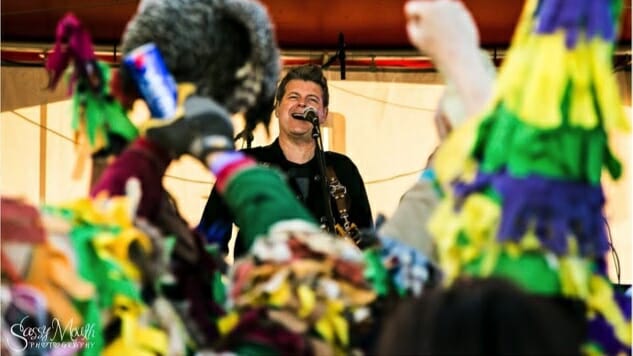The Resilience of Cajun Music: Steve Riley and Eunice, La.
Road Music, Chapter 3
Steve Riley photo by Sassy Mouth, courtesy of the Mamou Playboys
Mardi Gras is French for Fat Tuesday, the last day in the Catholic calendar for enjoying oneself before Ash Wednesday and the renunciations of Lent. But in South Louisiana one day is not enough of a party, so they stretch the Mardi Gras season out for weeks; the day before is even called Lundi Gras—or Fat Monday.
And at the Lakeview Park & Beach, an RV park between Eunice and Mamou, Louisiana, Lundi Gras caps off a long weekend of live Cajun and Creole music with a show by the Acadiana region’s top band, Steve Riley & the Mamou Playboys. In the park’s dancehall—an old barn with weathered siding and exposed rafters—this quintet is singing in French and pushing and pulling at the rhythm with fiddle and guitar, prodding the crowded room into action. “Allons danser,” Riley cries over his own button-accordion riff, as couples pair off for two steps, waltzes and blues.
The thermometer has dipped into the 30s on this unusually cold March evening, and the band, like the audience, is wrapped in woolen hats, scarfs, sweaters and fingerless gloves, as the space heaters work to fight off the chill. More effective than the machines, however, is the body heat generated by the musicians and dancers alike, and the layers of extra clothing soon come off, piece by piece.
The entire event becomes a collaborative effort between the performers and listeners. The band sounds different at home than it does at an out-of-state performing arts center, because the musicians respond to an audience that not only wants to dance but also knows how and why. And the audience responds in turn to the tunes sung in French and played on fiddles, accordions and guitars, because it sounds like home and nowhere else. The culture cements the community, and the community feeds the culture.
“Cajuns and Creoles own this music and culture,” Riley said after the dance. “Sometimes I feel like we’re in another country here in Deep South Louisiana. We musicians are a function of society here. Cajun/Creole music is played weekly at dancehalls, festivals, weddings, funerals, weekend get togethers and, of course, Mardi Gras.”
This was most obvious when the Mamou Playboys sang “La Danse de Mardi Gras,” the ancient anthem for the Fat Tuesday celebrations. It was made famous by the Cajun music pioneers the Balfa Brothers, and Riley learned it directly from the master fiddler/singer Dewey Balfa while playing in the latter’s final band. The song’s haunting modal melody has roots in Celtic France, where the Acadians lived before emigrating to Nova Scotia and then South Louisiana, and the French lyrics describe how the rural French tradition of Carnival was adapted by the farmers who settled along the Gulf Coast.
“Capitaine, capitaine, voyage ton flag,” Riley sang at Lakeview in an echo of the Balfas, and the dancers in front of him sang the words with him. “Allons chez un autre voisin; demandé la charité pour les autres qui viennent nous rejoindre,” “Captain, captain,” they’re saying, “wave your flag. Let’s go to the next neighbor and request a gift for those who will be joining us” at the feast.

Steve Riley & the Mamou Playboys (from left: Kevin Wimmer, Brazos Huval, Riley, Kevin Dugas and Sam Broussard) (Photo by Sassy Mouth, courtesy of the Mamou Playboys)
The next day these instructions for a traditional Mardi Gras celebration were carried out to the letter by a group of young musicians led by Joel Savoy, his brother Wilson and Jourdan Thibodeaux through St. Landry and Evangeline Parishes. Everyone was in costume and mask, mostly dressed in screen-door-wire masks and pajamas dripping with strips of colored cloth, though there were dozens and dozens of variations on this simple model.
Thibodeaux, the Mardi Gras captain in a purple and white satin cape, led the way on horseback down a two-lane blacktop to a neighboring farm. He road up to the farmer and formally asked permission to come onto the property. When he waved his flag, all the Mardi Gras (the name for the participants as well as the holiday) rushed up and knelt on the muddy lawn before the family who lived there. The farmer offered a chicken for the gumbo pot but announced that we’d have to catch it. He threw the bird in the air and the younger revelers went tear-assing in pursuit.
-

-

-

-

-

-

-

-

-

-

-

-

-

-

-

-

-

-

-

-

-

-

-

-

-

-

-

-

-

-

-

-

-

-

-

-

-

-

-

-









































